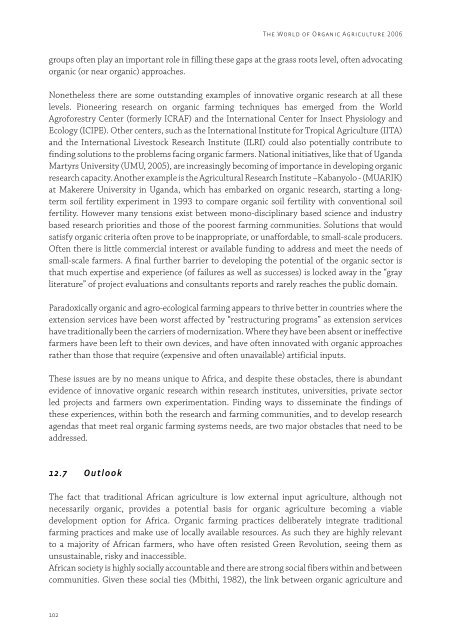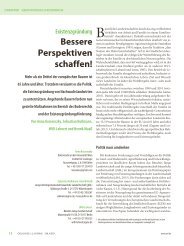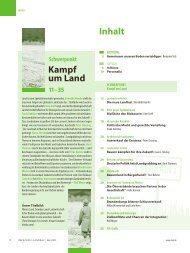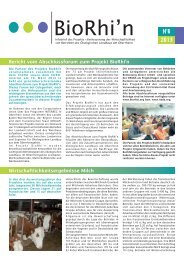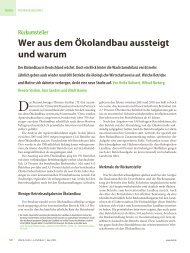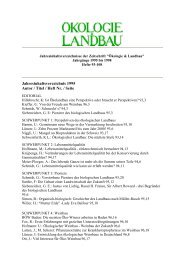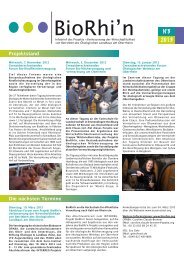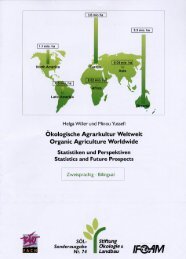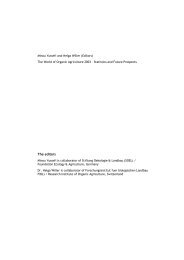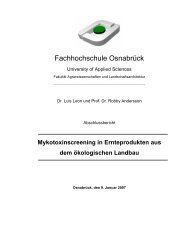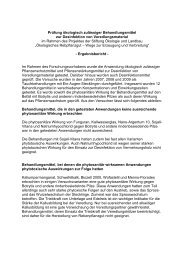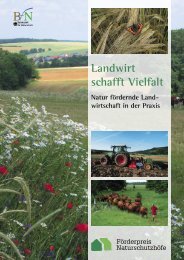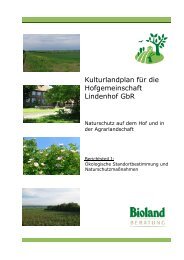the world of organic agriculture - Organic Eprints
the world of organic agriculture - Organic Eprints
the world of organic agriculture - Organic Eprints
Create successful ePaper yourself
Turn your PDF publications into a flip-book with our unique Google optimized e-Paper software.
102<br />
The World <strong>of</strong> <strong>Organic</strong> Agriculture 2006<br />
groups <strong>of</strong>ten play an important role in filling <strong>the</strong>se gaps at <strong>the</strong> grass roots level, <strong>of</strong>ten advocating<br />
<strong>organic</strong> (or near <strong>organic</strong>) approaches.<br />
None<strong>the</strong>less <strong>the</strong>re are some outstanding examples <strong>of</strong> innovative <strong>organic</strong> research at all <strong>the</strong>se<br />
levels. Pioneering research on <strong>organic</strong> farming techniques has emerged from <strong>the</strong> World<br />
Agr<strong>of</strong>orestry Center (formerly ICRAF) and <strong>the</strong> International Center for Insect Physiology and<br />
Ecology (ICIPE). O<strong>the</strong>r centers, such as <strong>the</strong> International Institute for Tropical Agriculture (IITA)<br />
and <strong>the</strong> International Livestock Research Institute (ILRI) could also potentially contribute to<br />
finding solutions to <strong>the</strong> problems facing <strong>organic</strong> farmers. National initiatives, like that <strong>of</strong> Uganda<br />
Martyrs University (UMU, 2005), are increasingly becoming <strong>of</strong> importance in developing <strong>organic</strong><br />
research capacity. Ano<strong>the</strong>r example is <strong>the</strong> Agricultural Research Institute –Kabanyolo - (MUARIK)<br />
at Makerere University in Uganda, which has embarked on <strong>organic</strong> research, starting a longterm<br />
soil fertility experiment in 1993 to compare <strong>organic</strong> soil fertility with conventional soil<br />
fertility. However many tensions exist between mono-disciplinary based science and industry<br />
based research priorities and those <strong>of</strong> <strong>the</strong> poorest farming communities. Solutions that would<br />
satisfy <strong>organic</strong> criteria <strong>of</strong>ten prove to be inappropriate, or unaffordable, to small-scale producers.<br />
Often <strong>the</strong>re is little commercial interest or available funding to address and meet <strong>the</strong> needs <strong>of</strong><br />
small-scale farmers. A final fur<strong>the</strong>r barrier to developing <strong>the</strong> potential <strong>of</strong> <strong>the</strong> <strong>organic</strong> sector is<br />
that much expertise and experience (<strong>of</strong> failures as well as successes) is locked away in <strong>the</strong> “gray<br />
literature” <strong>of</strong> project evaluations and consultants reports and rarely reaches <strong>the</strong> public domain.<br />
Paradoxically <strong>organic</strong> and agro-ecological farming appears to thrive better in countries where <strong>the</strong><br />
extension services have been worst affected by “restructuring programs” as extension services<br />
have traditionally been <strong>the</strong> carriers <strong>of</strong> modernization. Where <strong>the</strong>y have been absent or ineffective<br />
farmers have been left to <strong>the</strong>ir own devices, and have <strong>of</strong>ten innovated with <strong>organic</strong> approaches<br />
ra<strong>the</strong>r than those that require (expensive and <strong>of</strong>ten unavailable) artificial inputs.<br />
These issues are by no means unique to Africa, and despite <strong>the</strong>se obstacles, <strong>the</strong>re is abundant<br />
evidence <strong>of</strong> innovative <strong>organic</strong> research within research institutes, universities, private sector<br />
led projects and farmers own experimentation. Finding ways to disseminate <strong>the</strong> findings <strong>of</strong><br />
<strong>the</strong>se experiences, within both <strong>the</strong> research and farming communities, and to develop research<br />
agendas that meet real <strong>organic</strong> farming systems needs, are two major obstacles that need to be<br />
addressed.<br />
12.7 Outlook<br />
The fact that traditional African <strong>agriculture</strong> is low external input <strong>agriculture</strong>, although not<br />
necessarily <strong>organic</strong>, provides a potential basis for <strong>organic</strong> <strong>agriculture</strong> becoming a viable<br />
development option for Africa. <strong>Organic</strong> farming practices deliberately integrate traditional<br />
farming practices and make use <strong>of</strong> locally available resources. As such <strong>the</strong>y are highly relevant<br />
to a majority <strong>of</strong> African farmers, who have <strong>of</strong>ten resisted Green Revolution, seeing <strong>the</strong>m as<br />
unsustainable, risky and inaccessible.<br />
African society is highly socially accountable and <strong>the</strong>re are strong social fibers within and between<br />
communities. Given <strong>the</strong>se social ties (Mbithi, 1982), <strong>the</strong> link between <strong>organic</strong> <strong>agriculture</strong> and


